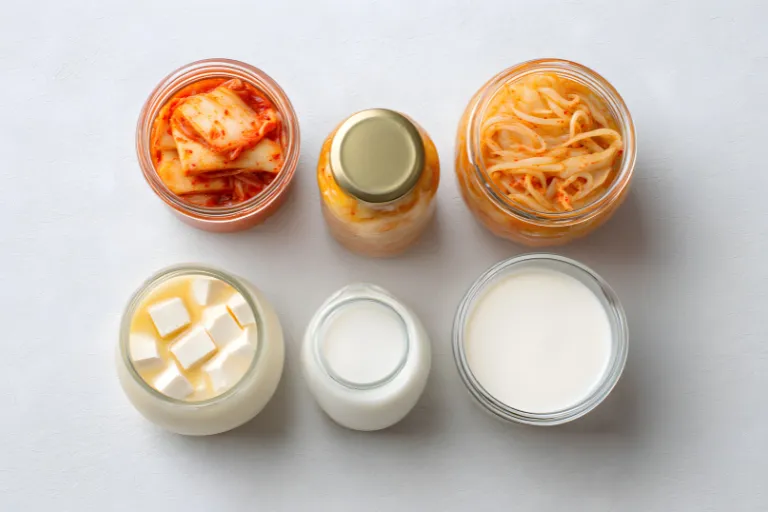Key Points
- Fermented foods support gut health, which can influence mood through the gut-brain axis.
- Probiotics and beneficial bacteria may help balance neurotransmitters like serotonin and GABA.
- Early studies link regular consumption of fermented foods to reduced depressive and anxious symptoms.
- Incorporating fermented foods into a balanced diet may naturally support emotional well-being.
Your Gut May Be More Responsible for Your Mood Than You Think
It’s a surprising idea—that the secret to emotional balance could begin not in the brain, but in the gut. Yet a growing body of research suggests that fermented foods like yogurt, kimchi, and sauerkraut may play a subtle but meaningful role in supporting relief from depressive states and anxious thoughts.
Once dismissed as a fringe concept, the “gut-brain connection” is now one of the most intriguing frontiers in mental health research. What we eat doesn’t just fuel our bodies—it may also shape our thoughts, moods, and resilience.
Why This Connection Matters
Modern lifestyles, marked by stress, processed diets, and irregular sleep, can disrupt the delicate balance of microorganisms in the gut. This imbalance—known as gut dysbiosis—has been linked to increased inflammation, disrupted immune function, and emotional instability.
Many people facing low mood or racing thoughts find that conventional therapies alone don’t always provide full relief. As a result, there’s growing curiosity about whether simple dietary shifts could complement established therapies. Fermented foods, long celebrated for their digestive benefits, are now being studied for their potential to support emotional health.
Inside the Gut-Brain Axis: How the Microbiome Talks to the Mind
At the heart of this connection is the gut-brain axis, a complex communication network linking the gastrointestinal system and the central nervous system. This relationship is partly regulated by the vagus nerve, a key communication pathway that allows signals to flow between the gut and the brain [1].
Beneficial bacteria in fermented foods—such as Lactobacillus and Bifidobacterium—may influence this system in several ways:
- Neurotransmitter Production: Some bacterial strains can produce neurotransmitters like serotonin and gamma-aminobutyric acid (GABA), both crucial for mood stability [2].
- Reduced Inflammation: Probiotics can help regulate immune responses, lowering chronic inflammation often linked to depressive states [3].
- Improved Stress Response: Balanced gut flora may help regulate cortisol, the body’s main stress hormone [4].
This interplay between microbes, neurotransmitters, and hormones has led some researchers to describe the gut as a “second brain.”
What the Research Shows
Scientific interest in the psychological impact of fermented foods has grown rapidly over the past decade. In one study published in Psychiatry Research, individuals who consumed fermented foods regularly reported fewer symptoms of social anxiety—particularly those with higher levels of neuroticism [5].
Another study in Nutrients found that probiotic-rich yogurt consumption was associated with lower depressive scores and improved emotional regulation among healthy adults [6]. Meanwhile, a 2020 meta-analysis concluded that probiotic supplementation may modestly reduce depressive symptoms, though more large-scale studies are needed to confirm the effect [7].
While these findings are promising, researchers caution that fermented foods are not a cure. The results suggest supportive benefits that may complement other therapies, rather than replace them.
Bringing Fermented Foods Into Your Diet
For those curious about adding fermented foods to support emotional balance, the best approach is simple and gradual. A small daily serving—such as half a cup of yogurt or a few forkfuls of kimchi—can be a good start.
Here are some of the most studied and accessible options:
- Yogurt and Kefir: Contain live cultures like Lactobacillus and Bifidobacterium that may influence serotonin levels.
- Kimchi and Sauerkraut: Provide lactic acid bacteria that support gut integrity and immune balance.
- Miso and Tempeh: Offer beneficial microbes along with plant-based proteins.
- Kombucha: A fermented tea rich in organic acids, though it’s best to choose low-sugar varieties.
Choose unpasteurized or “live culture” versions to ensure the bacteria remain active. Those with digestive issues or sensitivities should consult a health professional before making significant dietary changes.
Important Considerations and Safety Notes
While fermented foods are beneficial for most, they contain biogenic amines (like histamine and tyramine) that can cause issues for specific individuals:
- Histamine Intolerance: Some people with “leaky gut” or enzyme deficiencies (DAO deficiency) may find that fermented foods increase their anxiety or cause brain fog, headaches, and heart palpitations. This is due to a histamine buildup rather than a lack of “good” bacteria.
- MAOI Interactions: Individuals taking older antidepressants (MAOIs) must be careful with fermented foods like aged sauerkraut or miso, as the high tyramine content can cause a dangerous spike in blood pressure.
The Future of Psychonutrition
The idea that mood can be influenced by food has given rise to a new field called psychonutrition, exploring how diet shapes mental well-being. As researchers continue to decode the gut-brain axis, future studies may identify which bacterial strains or fermentation methods offer the most benefit for specific emotional symptoms.
Although we’re still in the early stages of understanding these connections, one message is clear: nurturing your microbiome through diverse, nutrient-rich foods may also nurture your mind.
Conclusion
From the tangy taste of sauerkraut to the creamy texture of yogurt, fermented foods offer more than flavor—they may offer a quiet form of emotional support. While not a substitute for therapy or medication, they represent a simple, natural way to help the gut and brain work in harmony.
The mind and the microbiome, it turns out, may share the same appetite for balance.
Medical Disclaimer:
This article does not in any way constitute medical advice. Please seek consultation with a licensed medical professional before starting any therapy. This website may receive commissions from links or products mentioned in this article.
Subscribe for Free for more insightful health articles tailored to your needs.
Sources
- Mayer, E. A., Tillisch, K., & Gupta, A. (2015). Gut/brain axis and the microbiota. The Journal of Clinical Investigation, 125(3), 926–938. https://doi.org/10.1172/JCI76304
- Barrett, E., Ross, R. P., O’Toole, P. W., Fitzgerald, G. F., & Stanton, C. (2012). γ-Aminobutyric acid production by culturable bacteria from the human intestine. Journal of Applied Microbiology, 113(2), 411–417.
- Foster, J. A., & McVey Neufeld, K.-A. (2013). Gut–brain axis: How the microbiome influences anxiety and depression. Trends in Neurosciences, 36(5), 305–312.
- Allen, A. P., et al. (2016). Bifidobacterium longum 1714 as a psychobiotic: Reducing stress, anxiety, and improving memory. Translational Psychiatry, 6(11), e939.
- Hilimire, M. R., DeVylder, J. E., & Forestell, C. A. (2015). Fermented foods, neuroticism, and social anxiety: An interaction model. Psychiatry Research, 228(2), 203–208.
- Chao, S.-H., et al. (2021). Probiotic yogurt consumption and depressive symptoms in healthy adults. Nutrients, 13(9), 3103.
- Liu, R. T., Walsh, R. F. L., & Sheehan, A. E. (2019). Prebiotics and probiotics for depression and anxiety: A meta-analysis of controlled trials. Neuroscience & Biobehavioral Reviews, 102, 13–23.



